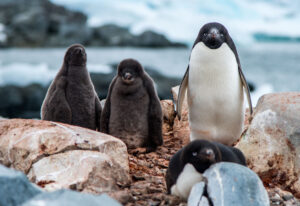History of the Polar Literacy Principles
The goal of the Polar Interdisciplinary Coordinated Education (Polar-ICE) program was to engage the public in under-standing how Polar Regions influence our lives while improving their understanding of how scientists work to measure and understand the changing Polar Regions and the global climate system. Through this work, the need emerged for a unified set of messages about the Polar Regions that identify the “big ideas” all people should know about the Poles, the regions which regulate the Earth’s climate.
The development of these key concepts in Polar Science was an iterative process involving both educators and scientists in creating, reviewing, and prioritizing Polar Science communication objectives for both scientists and educators wishing to engage the public in Polar Science.

Photo by Andrew Corso
Our efforts to create a consensus document for Polar Science communication was inspired by the Ocean Literacy initiative. The Ocean Literacy Principles and complementary OL Scope and Sequence document, identify, articulate, and organize the core concepts of ocean sciences for educational purposes. These documents are a powerful tool for elevating the prominence of ocean sciences in the mainstream K-12 and informal science education systems, and to guide decisions on how to spend time and resources in educational program development. They continue to be the foundation and inspiration for numerous significant accomplishments nationally and internationally.
To Read More, check out the NMEA Currents special issue.
McDonnell, J.; Hotaling, L.; Schofield, O.; and Kohut, J. (2020). Key Concepts in Polar Science: Coming to Consensus on the Essential Polar Literacy Principles. Currents Journal of Marine Education. Vol.34 (1). P. 2-8.

